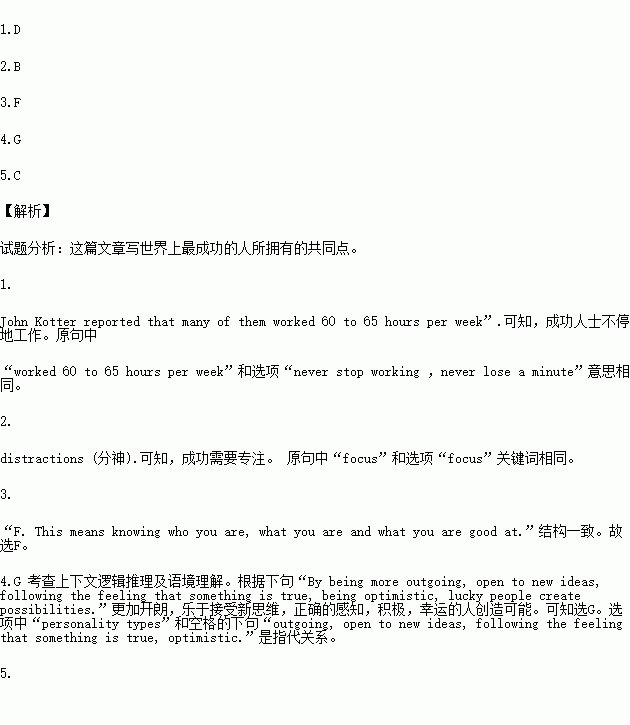题目内容
根据短文内容,从短文后的七个选项中选出能填入空白处的最佳选项。选项中有两项为多余选项。
What do the world’s most successful people all have in common?
By examining the work habits of over 150 greatest writers and artists and scientists, the researchers including Standford Professor Jeffrey Pfeffer found that high achievers like Robert Moses turn out to be all alike:
Busy ! Busy!
1. In a study of general managers in industry, John Kotter reported that many of them worked 60 to 65 hours per week—which translates into at least six 10-hour days. The ability and willingness to work difficult and tiring hours has characterized many powerful figures. Energy and strength provide many advantages to those seeking to build power.
Just Say No!
The difference between successful people and very successful people is that very successful people say “no” to almost everything. And that’s what gives them the time to accomplish so much. 2. And focus means saying “no” to a lot of distractions (分神).
Know What You Are!
Ignore your weakness and keep improving your strengths. Don’t waste time exploring skill areas where you have little competence. Instead, focus on—and build on—your strengths. 3.
Create Good Luck!
Luck is not magical—there is a science to it. Richard Wiseman studied lucky people for his book Luck Factor, and broke down what they do right. 4. By being more outgoing, open to new ideas, following the feeling that something is true, being optimistic, lucky people create possibilities.
Does applying these principles to your life actually work? Wiseman created a “luck school” to test the ideas—and it was a success. In total, 80 percent of people who attended Luck School said that their luck had increased. 5.
A. Spend enough time to improve your weakness.
B. Achievement requires focus.
C. On average, these people reported that their luck had increased by more than 40 percent.
D. They never stop working and they never lose a minute.
E. Busy people are more likely to be lucky.
F. This means knowing who you are, what you are and what you are good at.
G. Certain personality types are luckier because they behave in a way that offers the chance for good opportunities.
 导学与测试系列答案
导学与测试系列答案 新非凡教辅冲刺100分系列答案
新非凡教辅冲刺100分系列答案
